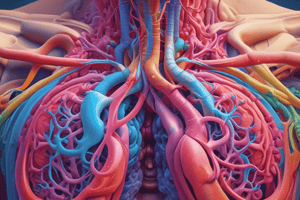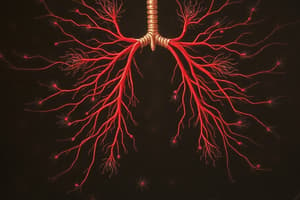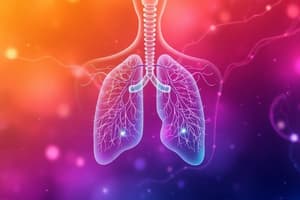Podcast
Questions and Answers
What is the primary function of the respiratory system?
What is the primary function of the respiratory system?
- To regulate body temperature
- To facilitate digestion and absorption of nutrients
- To move oxygen into body tissues and remove carbon dioxide from cells (correct)
- To produce sound and speech
What is the term for the process of moving air into and out of the lungs?
What is the term for the process of moving air into and out of the lungs?
- Pulmonary ventilation (correct)
- Respiratory zone
- External respiration
- Conducting zone
What is the region of the pharynx where air and food pass through?
What is the region of the pharynx where air and food pass through?
- Trachea
- Oropharynx and laryngopharynx (correct)
- Laryngopharynx
- Nasopharynx
What is the term for the exchange of gases between pulmonary blood and alveoli?
What is the term for the exchange of gases between pulmonary blood and alveoli?
What is the specialized structure used for gas exchange in most terrestrial vertebrates?
What is the specialized structure used for gas exchange in most terrestrial vertebrates?
What are the two zones of the respiratory system?
What are the two zones of the respiratory system?
What is the effect of increasing the volume of the lungs on air pressure?
What is the effect of increasing the volume of the lungs on air pressure?
What is the shape of the relaxed diaphragm?
What is the shape of the relaxed diaphragm?
What happens to the pressure inside the lungs during inhalation?
What happens to the pressure inside the lungs during inhalation?
What is the result of the contraction of the diaphragm during breathing?
What is the result of the contraction of the diaphragm during breathing?
What is the effect of the elevation of the rib cage during breathing?
What is the effect of the elevation of the rib cage during breathing?
What happens to the air during exhalation?
What happens to the air during exhalation?
What is the primary function of the diaphragm during inhalation?
What is the primary function of the diaphragm during inhalation?
Which muscles are responsible for elevating the ribs during inhalation?
Which muscles are responsible for elevating the ribs during inhalation?
What happens to the pressure inside the thoracic cavity during inhalation?
What happens to the pressure inside the thoracic cavity during inhalation?
What is the role of the transversus thoracis muscle during exhalation?
What is the role of the transversus thoracis muscle during exhalation?
During which phase of breathing is the pressure inside the thoracic cavity equal to the outside pressure?
During which phase of breathing is the pressure inside the thoracic cavity equal to the outside pressure?
What is the result of the volume of the thoracic cavity increasing during inhalation?
What is the result of the volume of the thoracic cavity increasing during inhalation?
Flashcards are hidden until you start studying
Study Notes
Respiratory System
- Respiratory systems are organs that exchange gases with the environment.
Functions
- Allow oxygen into body tissues and remove carbon dioxide from cells.
Specialized Structures
- Gills (Aquatic Animals)
- Spiracles (Terrestrial Insects)
- Lungs (Most Terrestrial Vertebrates)
Pulmonary Ventilation
- Moving air into and out of the lungs (breathing)
External Respiration
- Gas exchange between pulmonary blood and alveoli
- Oxygen is loaded into the blood
- Carbon dioxide is unloaded from the blood
Zones of the Respiratory System
- Respiratory Zone: where gas exchange occurs within the lungs
- Conducting Zone: where air comes in and out of the body
Human Respiratory System
- Three regions of the pharynx (throat): Nasopharynx, Oropharynx, and Laryngopharynx
- The oropharynx and laryngopharynx are common passageways for air and food
Lung Structure
- Left lung has two lobes: superior and inferior
- Right lung has three lobes: superior, middle, and inferior
- Apex extends up to the base of the neck, above the first rib
- Base of the lung sits on the diaphragm
External Respiration Processes
- Pulmonary ventilation or breathing
- Gas diffusion across the respiratory membrane and between blood and body tissues
- Transport of O2 and CO2 in blood
Internal Respiration
- Absorption and use of oxygen by tissue cells
- Release of carbon dioxide from tissue cells
Pressure and Airflow into Lungs
- Increase in volume decreases air pressure
- Decrease in volume increases air pressure
Changes in Thoracic Volume
- Relaxed diaphragm is dome-shaped
- Contraction pulls it downward, expanding the lungs
- Rib cage elevation expands the thorax, relaxation depresses it
Studying That Suits You
Use AI to generate personalized quizzes and flashcards to suit your learning preferences.




